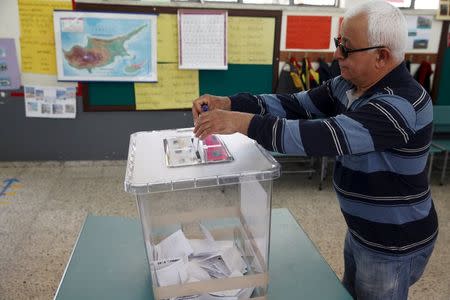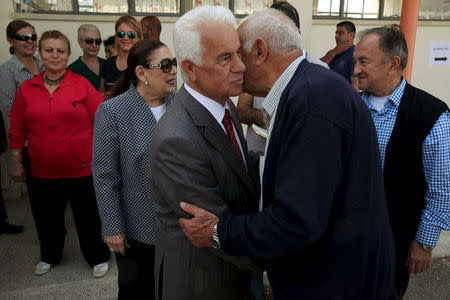Northern Cypriots vote for new leader who can succeed in peace talks
By Simon Bahceli NICOSIA (Reuters) - Turkish Cypriot voters went to the polls on Sunday to elect a new president, hoping he or she will succeed in forging a peace deal with Greek Cypriots on the ethnically-split island. Opinion polls put conservative incumbent Dervis Eroglu in the lead ahead of the six other candidates. But he is not expected to win enough votes in the first round, paving the way for a runoff on April 26. Other leading candidates are centre-left politician Sibel Siber, and leftist Mustafa Acinci, a moderate. "I want to wish the decision of the people will be good for all, not only for the Turkish Cypriots but for all inhabitants of this lovely island," Acinci told Reuters. Only Turkey recognises the self-declared Turkish Republic of Northern Cyprus. The international community views the Greek Cypriot government in Nicosia as the legitimate government of the whole island. Peace talks aiming for re-unification between the two sides have been on hold since October 2014, when Greek Cypriots suspended their participation in anger at perceived moves by Turkey to challenge their sovereign rights in exploring for natural gas. The so-called Cyprus problem dominates politics on both sides of the divide, and it was foremost on voters' minds on Sunday. "Nobody recognises Turkish Cypriot identity, there is a Turkish Republic of Northern Cyprus, but nobody recognises it," said Halil Davulcu, 47, just after he cast his vote at a polling station in Nicosia. "Maybe if this problem is solved then our identity will become known." A United Nations envoy recently said he was optimistic that the stalled talks could resume soon, possibly as early as next month. The conflict remains a key source of tension between NATO allies Greece and Turkey. Almost 177,000 Turkish Cypriots are eligible to vote in Sunday's election. Cyprus was split by a Turkish military invasion in 1974 which followed a brief Greek-inspired coup. Economically, disparities between the Turkish and Greek sides have waned somewhat in recent years, particularly after Greek Cypriots required an international bailout in 2013. However, differences remain. The minimum wage on the Turkish side is 500 euros, versus 800 euros on the Greek side. "Our greatest dream is to see better days, and this is why the presidential elections are so important to us," candidate Siber said after casting her vote. (Editing by Jane Merriman)

 Yahoo News
Yahoo News 


